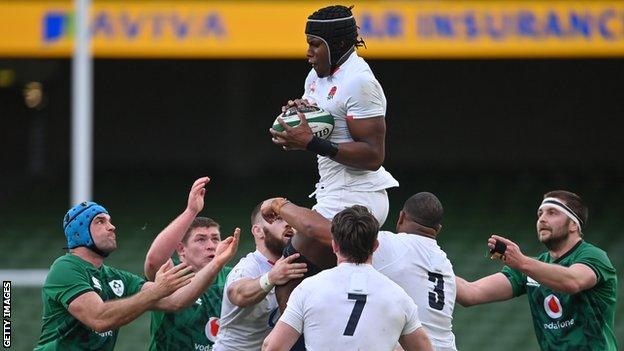Maro Itoje says rugby union needs to do more to increase diversity
- Published
Rugby must do more to increase diversity - Itoje
Rugby union can do more to increase diversity in the sport, says British and Irish Lions and England forward Maro Itoje.
The Saracens lock discussed issues of race in the game with his former headmaster Floyd Steadman, an ex-scrum-half for Itoje's club who was the first black captain in the top tier of English rugby union.
After his playing career, Steadman went on to become headmaster at Salcombe Prep School in north London, where he introduced a young Itoje to the sport.
"Rugby needs to cast its net wider to include more people and attract more talent," Itoje told Radio 5 Live.
"The Rugby Football Union does a lot. Can they do more? Perhaps. Premiership Rugby does some things. Can they do more? Definitely. Premiership clubs probably don't do as much as they should. Can they do more? 100%.
"The more invested we all are in this, the greater the outcome will be.
"It has to do more to attract young rugby players from different backgrounds, environments and socio-economic groups and if it does that, everyone wins.
"There will be a better game and a better product and will lead to more fans, more people engaging and more demand for the broadcasters in terms of TV and for the guys putting money behind it
"Everyone's a winner when the game is more diverse."
Earlier this year, the RFU launched an independent diversity and inclusion advisory group which will "shape plans" and "challenge the RFU on its progress" in the area.
The group is chaired by former England wing Ugo Monye, with former England World Cup winner and current Wasps Ladies director of rugby Giselle Mather the vice-chair.
The RFU said the "priority areas for action" were currently "ethnicity, gender, socio-economic status, sexual orientation and age".
Steadman said he was proud of what players such as Itoje were doing to raise the issues of racism and diversity.
"Some of what I had to deal with in my playing days was racist abuse, but a lot of it was unconscious bias from fans, opponents and team-mates," he recalls.
"A lot of it was also language which people thought was appropriate at the time but I knew it wasn't.
"People would make assumptions based on the colour of my skin and I've challenged them to look again at me, the man."

Itoje has won three Six Nations Championships with England
Itoje is recognised for his strong stance against racism and earlier this year he became a patron of The Black Curriculum, a social enterprise that aims to fill in gaps in the current UK schools curriculum by teaching black British history all year round.
"We're all in this journey together," he said. "Black, brown, white, blue, pink and I do believe the more we converse with one another, the more we understand one another and educate one another on different people's opinions, ways of life and ways of seeing things, the closer we will get to a more equitable society."
While Itoje still takes the knee before games, he denied that he felt let down when not joined by all of his England team-mates.
"One thing that is clear from all the England players is that they're against racism, they're against discrimination and they're against any form of racial abuse," he says.
"Each player has to make their judgement whether they feel comfortable doing that and players will have their certain reasons.
"I'm not going to say if you don't take the knee it means you are racist, that's too simplistic.
"But while I do believe symbolic gestures are important, the most important thing is doing the work when you are in the public eye but also in private life as well."

'That day was going to be a bad day': Exclusive footage and interviews from January's storming of the US capitol
Ridley Road: Caught between life and death in the swinging sixties
